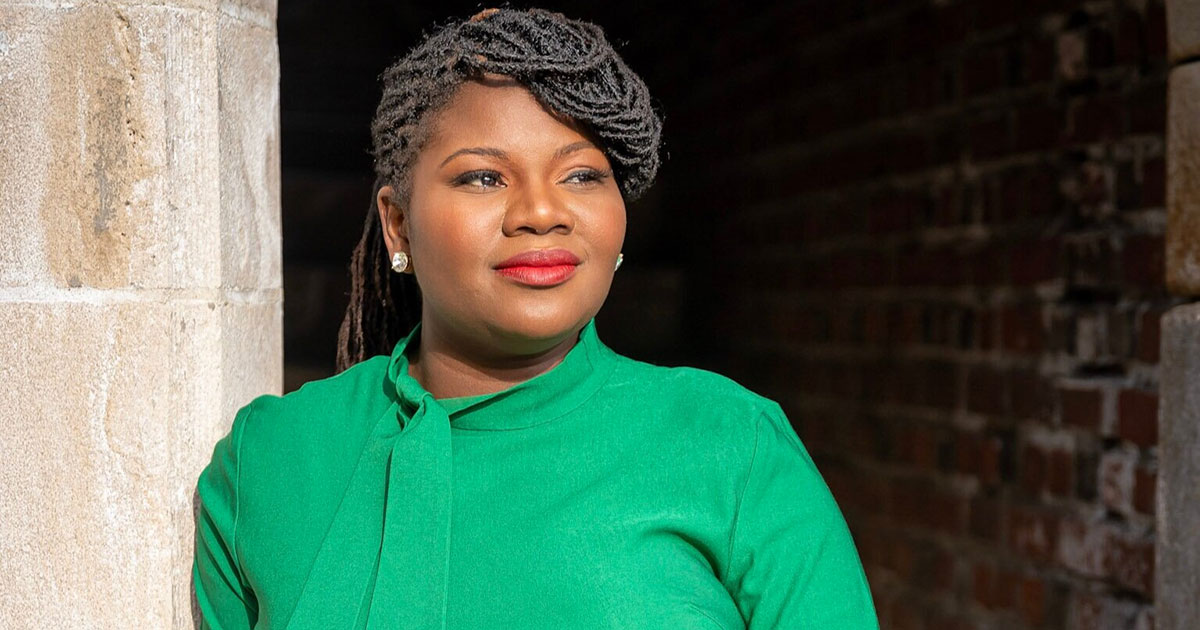Babson Celebrates the Joy of Juneteenth

Go to a Juneteenth celebration, and you’ll likely see food with a red hue. Think strawberries and saucy barbecue and red beans and rice.
“When I am cooking on duty, I always make sure to have a red velvet cake,” said author and historian Kellie Carter Jackson, an associate professor in the Department of Africana Studies at Wellesley College. “Last year for the first time, I made red cornbread that’s actually made from beets and bourbon. So good.”
That food may taste good, but all that red underlies a deeper meaning, one heaped with history and the spirit of a people. “Reds are meant to symbolize the perseverance and the blood that was shed during slavery,” Jackson said, “and how Black people have been resilient.”
Jackson was the keynote speaker at Babson College’s celebration of Juneteenth on June 15. Filled with words and song, the event served, in part, as a look back to the past. “The concept of freedom is something that none of us should take for granted,” said Amanda Strong ’87, a member of Babson’s Board of Trustees and one of several College speakers who addressed the virtual event.
Most of all, though, the event was a time to embrace joy. “When we talk about Juneteenth, it is a celebration more than anything else,” said Jackson, whose thoughts and words have appeared in numerous publications, podcasts, and documentaries.
That’s not to say the pains of the past or the racism that still lingers today are blindly ignored, but Juneteenth is a day for dressing up and stepping out, for eating and gathering together. “Go to a barbecue to meet with family and to meet with friends and to celebrate all of the things that Black people have achieved,” Jackson said, “and to not ignore the racism, to not forget about the racism, but to celebrate in spite of it.”
Focus on Joy
As Jackson began her talk, she spoke of the origins of Juneteenth, of how the news of the Emancipation Proclamation took more than two years to reach the enslaved people of Galveston, Texas. On the date the news arrived via the Union army, June 19, 1865, a spontaneous celebration broke out, and people began looking for family members, seeking to reunite with them.
Jackson read the account of a formerly enslaved person from Texas, Felix Haywood, who recalled the day the Union army arrived and he was emancipated. “We was all walking on golden clouds. Everyone went wild,” Haywood said years later of that moment. “We was free. Just like that, we was free.”
In the years immediately following the Civil War, Jackson said, Black people made tremendous strides, opening schools and banks and being elected to public office. Unfortunately, that progress was short-lived. A backlash ensued. Lynchings became commonplace.
“We acknowledge we have traveled miles away from where we have started, yet we have thousands of roads, hills, and paths ahead of us.”
Denicia Ratley, Babson’s director of religious and spiritual life
“A lot of this violence is a result of a backlash against Black progress,” Jackson said. “You see throughout time, every time Black people have a moment of success, a moment of shine, that there were always violent repercussions of that.”
Jackson, though, didn’t want to just talk about the ongoing challenges that Black people face. “We are all very familiar with the violence that comes along with white supremacy, but what I want to talk about is the resiliency, because the joy is how Black people push back,” she said.
That is the joy of singing and dancing, of cooking and creating and experiencing the glorious wide array of things that make us human. “I really want us to focus on Black joy,” she said. “Joy and resistance and laughter and music and food is the way that we affirm our humanity. It’s the way that we affirm our freedom.”
What Is Possible
Jackson asserted that Juneteenth also can be a day for action. Some holiday gatherings register attendees to vote. Others, during the pandemic, served to vaccinate people.
There is work to do, and speakers at Babson’s Juneteenth event recognized that. “We acknowledge we have traveled miles away from where we have started, yet we have thousands of roads, hills, and paths ahead of us,” said Denicia Ratley, Babson’s director of religious and spiritual life.
“Joy and resistance and laughter and music and food is the way that we affirm our humanity. It’s the way that we affirm our freedom.”
Kellie Carter Jackson, associate professor in the Department of Africana Studies at Wellesley College
Babson President Stephen Spinelli Jr. MBA’92, PhD said the College remains committed to educating and empowering entrepreneurial leaders who are empathetic, inclusive, and resilient. “They are stepping into the greatest challenges of our time with open minds and open hearts to help heal wounds and create unity,” he said. “Our community of diverse inclusive leaders has risen to the occasion and is building a better present.”
Juneteenth is very much about that present and the future to come. Jackson compared the month of Juneteenth with February and its celebration of Black history. “For me, I think Black History Month, February, is all about the past,” she said. “It’s all about celebrating what has been done, and that’s all important.”
June, on the other hand, should be about looking ahead. As Jackson said, “I feel like June should be a moment where we think about what is possible, what is something that we can imagine that we can create for ourselves, what is the space and the world that we want to live in and belong to?”
Posted in Community






